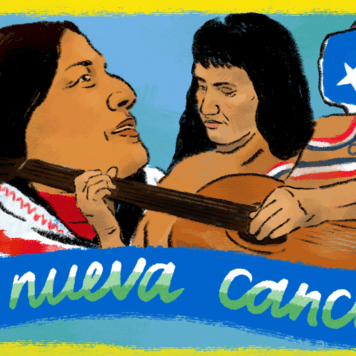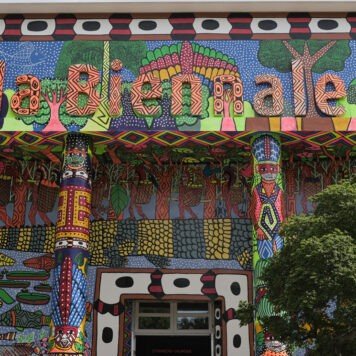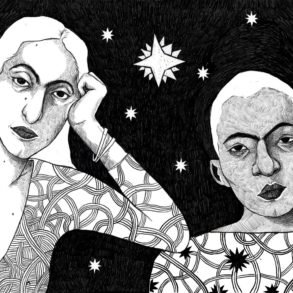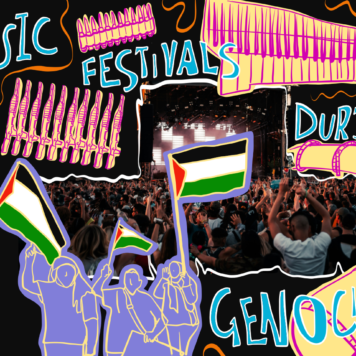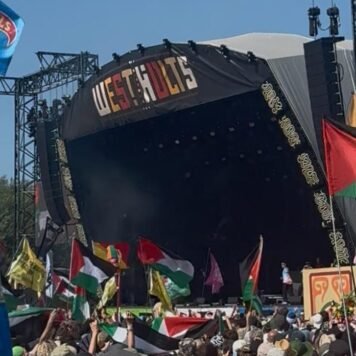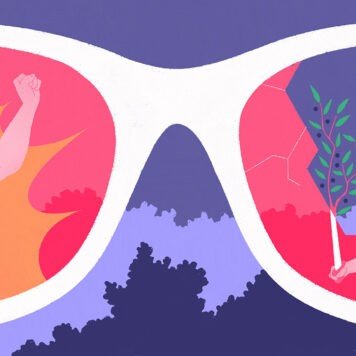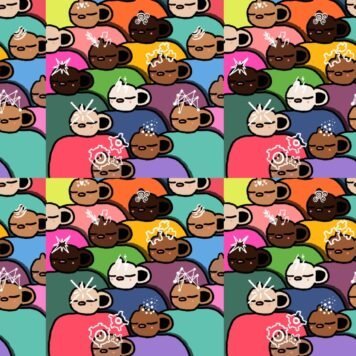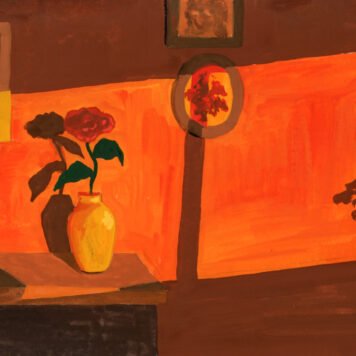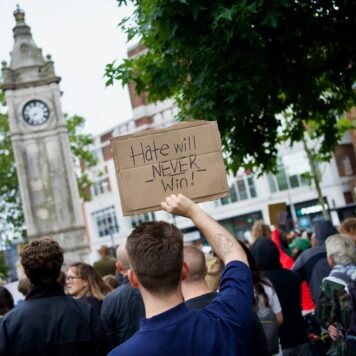Following shado’s film screening on 9th May, shado sat down with the director of BOX, Matt Barton and boxing coach, Josh McDonald to find out more about their aims, the process of making the film and the role the boxing club played in the Calais ‘Jungle’.
Box is a collaborative film made in Calais which details the impending eviction of the ‘Jungle’ as shown through the prism of the camp’s boxing club.
The film presents an important narrative which brings together the mental side effects of the instability of the ‘Jungle’ during this time and the role of the boxing club as a space of community, physical exercise and escape.

How did the idea for BOX come about?
Matt: Interestingly a few years ago, Josh replied to an online ad for a room I had going in my house. When he moved in we began talking about what he was up to in more detail. Through these conversations I became curious about the boxing club and the situation as a whole. The film in many ways was born out of this crossing of paths. I still like to think of it as serendipitous.
How long did you spend in Calais and what made you decide to start a boxing club?
Josh: I arrived in Calais in January 2016 and left properly nine months later upon the camps closure in October the same year.
Three months in as a long term volunteer, after having spent most of my volunteering hours within the camp, I reached a point where I could see gaps within the current grassroots support systems. As women and children came first in the line of aid I saw the camps majority, that being of adult men, without outlets to support their physical, mental and social needs.
Together with the racial tensions and cultural divides amongst the camp’s nationalities, further fueled by the harsh and cramped living conditions and daily police harassment, the ‘Jungle’ became a dangerous place at times which posed further needs that weren’t being met.
Inspired by successful community projects I had seen in the UK, such as Block Workout and SpartanFam, that used fitness to overcome adversity, empower communities and engage hard to reach young men, I set out to create my own.
Boxing became our medium through experimenting with fund-raised mixed martial arts equipment. Some of the guys I was working with were ex-military and boxing was something they knew already so we stayed with it.

Negative language and imagery surrounding the ‘Jungle’ dominated mainstream media in 2015 and 2016 – what were some of the biggest problems you found with this and did this impact your aims and motivations for BOX?
Matt: In many respects I made this film as a retaliation to the dominant rhetoric and modes of representation that surrounded the crisis. So much of what I knew about the camp before visiting came from news coverage.
Exercise is generally a tool to empower individuals and through this prism there was scope to find something of the visceral, away from the didactic narratives of the mainstream.
The gesture of the exercise; how individuals expressed their tension onto the punch bag, soon became the language to understand the situation.
As a whole I found it very difficult to comprehend the reality of the ‘Jungle’. My way of grasping the complexity was to find a universal experience which the audience could connect with. We all understand exercise and exertion and so this felt like an authentic perspective to view things from.
What do you hope the viewer will take away from watching BOX?
Matt: I hope the films serves to give insight into the state of mind of individuals living within this environment.
Why was boxing so important for the men who participated? What do you think the benefits of boxing are on mental health etc., especially in light of the mental effects of the ‘Jungle’ updates which feature in the film?
Josh: The act of boxing helped gave back self-pride, dignity and respect.The ‘Jungle’ hence the name was not a place for people, yet we made the most out of what we had. By training together communally and pushing each other physically it gave rise to the opportunity for participants to be the best they could be and to be supported by the guys around them in that moment. We all wished the best for each other and so the act of boxing gave back much more than just the physical benefits of exercise. We became a brotherhood and our training held space for our community.
Subscribe to shado's weekly newsletter
Exclusive event news, job and creative opportunities, first access to tickets and – just in case you missed them – our picks of the week, from inside shado and out.

Socially boxing isn’t considered a team sport but as I’ve learnt through the Calais Jungle Boxing Club and my own training, the club you train with becomes your family. You motivate, support and inspire each other. During the build up to the camp’s closure this mutual support still remained and even now over two years after the eviction the connections we made during our time in Calais are as strong today as they were back then.
Group physical training definitely does wonders for mental health. I know if the guys from the club didn’t have each other during the eviction the whole ordeal would have been a lot harder for them to process. Our ‘jungle family’ is still going strong!

The boxing club as a structure seems to become symbolic of a space of sanctuary, safety and release. Can you talk a bit more about this?
Matt: Yes, in many ways the space was a place of community. It had a lot of different guises, a place to eat, sing, dance, sleep. I also likened the space to a kind of microcosm of the situation as a whole. Obviously the title of the film references the structure and the sport but I also wanted to suggest this idea of confinement or enclosure both in terms of physical and mental.
Can you tell us a bit more about the actual process of filming BOX – did you find most people as begin really positive and excited by the film or any negative feelings towards it ? (e.g. negative experiences with other photojournalists or fears of sharing their identity it?)
Matt: Making a film in the ‘Jungle’ was a conflicting experience. In the first instance you have a lot of other people journeying to the camp to research, understand and document the situation. What’s more, you’re fully aware of the rhetoric surrounding the ‘Jungle’ but also conscious of your own privilege in being able to step in and out of the space freely. I’m a big believer in understanding something through first-hand experience however and this was the motivation behind going to meet the club.
The community were very warm and inclusive. The intensity of the exercise and the organisation of the group was hugely impressive. I actually joined one of the sessions but had to bow out due to my terrible fitness levels. At the end of the sessions the group would eat together in the gym and talk. They invited me to share some food and I asked them what they thought about making a film. I wouldn’t say people were excited, more open to the possibility, but still cautious about being misrepresented.
I think the camp’s perspective on the media changed when they realised intense exposure hadn’t served to better their situation but had in many ways, made it worse.
It’s a complex issue, collaboration is always about trust and I was very mindful of this from the beginning. I was also determined to try and find another way to express the situation away from the dehumanised image I’d become accustomed to.
Filming spanned four long weekends in the lead up to the eviction. The first weekend I worked with brilliant crew; DOP (Marcus Autelli), Sound Recordist (Luke Harris) and Production Assistant (Jessica Monson). As shooting progressed, the budget started to drain and I shot the last two weekends by myself.
There were quite a few other photographers and ‘media professionals’ looking to document the space during the time I was there. On the most part these individuals took an acquisitive approach, some were more forceful than others. When a journalist is staging set-ups with club members and filming with an Iphone it’s hard not to see this as disrespectful. These situations did rile me up but at the same time I couldn’t try to claim any jurisdiction over the space. It was always for Josh and the group to discuss and handle media requests as a group.
On the whole I’m comfortable with how we produced the film. There is always going to be complexity in who the finished film serves and to what degree the club have benefitted but at the same time I hope it’s a record of events that everyone can take something from.
What was the reaction to the film on first screening it to those involved – how was it received and did you screen it in the camp?
Matt: The film completed quite a while after the ‘Jungle’ was evicted. I sent the film to some of the club members and Arselan (the main protagonist in the film) over Facebook. The response was positive – it’s tricky to communicate however as their English isn’t good and my Pashto is non-existent. I showed the film to Josh in-person and he understood the piece in terms of it’s humanity but not necessarily as a record of the gym.
What was your target audience – was it made for the people involved or did you aim for this to be shown to an outside audience?
Matt: Interesting question. For a little while I was trying to get the film commissioned for broadcast but it wasn’t picked up. I was planning on extending the story to cover the life of the club members as they transitioned into their more secure residencies across France. In this case, I would have made the film into a feature. As it stands, the piece is currently touring film festivals and being screened at community events such as yours. There is talk around placing the film in educational libraries in the US but generally I’d like people working and living within this landscape to watch the film. I would hope the piece can serve to champion more projects like this in the future.

Are you still involved with boxing in the UK/ are there any facilities in place in term sof boxing club etc with those of the men who are now in the UK?
Josh: Since the closure of the camp I’ve continued to maintain contact with most of the guys from the club through social media. As most of our friends are now living with refugee status in different cities across France, the extent of our engagement now consists of motivating and inspiring each other online via our private Facebook training group. Weekly we set each other new fitness challenges and share boxing tips and techniques to help keep the group stay active.
My own journey with boxing has led me to train competitively at Miguel’s Amatuer Boxing Club in Brixton. I still teach community classes and meet with asylum seeker/refugee friends for group training in London, however we don’t have our own fixed premises and session times and locations vary.
To refer a friend to our private Facebook group and/or our private training sessions in London then please message Josh via Instagram @josh_1glove
Also if you would like to keep up to date with future projects to do with the club then please follow our Facebook page for updates and further details.
www.facebook.com/calaisjungleboxingclub
To see more of Matt’s work, head to his website here

